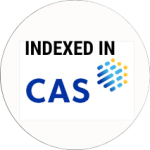Journal Menu
Editor Overview
jowppr maintains an Editorial Board of practicing researchers from around the world, to ensure manuscripts are handled by editors who are experts in the field of study.

Dr. S. Ravichandran
Professor
Lovely Professional University, Punjab, India
Editor in Chief
Journal of Water Pollution & Purification Research
Email :
Publisher
STM Journals, An imprint of Consortium e-Learning Network Pvt. Ltd.
E-mail: [email protected]
Tel: (+91) 0120- 4781 200, +91 120 478 1227
Mob: (+91) 981-007-8958, (+91)-966-7725-932
About the Journal
Journal of Water Pollution & Purification Research [0973-418X(e)] is a peer-reviewed hybrid open-access journal launched in 2006 that publishes Research /Review /Short articles covering new developments in Water supply, Purification, Water conditioning, and Treatment technology.
8
Papers Published
More details about the papers published here.
?
Article Processing Charge
Special Issues $1000
Regular Issues $950
APC Open Accesss [GOLD] $950
APC Open Accesss [GREEN] $450
8
Editorial Board Members
List of Editorial Board Members available here.
Focus and Scope
-
Water Purification Techniques: Wastewater purification, Magnetic separation, Nanomaterials, Environmental applications, Biobased polymers, Membranes, Composite, Salts rejection, Adsorbents, Metal ions, Dyes, Phosphates, Nitrates, Fluorides, Magnetic graphene oxide, Nanocomposites, Sustainable water purification, Heavy metals, Radionuclides and dyes, Pesticides and herbicides, Removal, Phthalates, Reverse osmosis, Nanofiltration, Ultrafiltration.
-
Biological, Chemical, and Physical Treatment of water: Water recycling, clogging, artificial recharge, effluent reuse, biogeochemistry, Groundwater, Malawi, Shallow well, Water quality, Pollutants, Effluents, Activated sludge, Nanotechnology, Pesticides, Hybrid treatment methods, Oilfield wastewater, Produced water, Oilfield brine, Treatment technology, Organic amendment, Soil organic carbon, Soil structural stability, Soil microbial respiration, Sludge-based adsorbent, Chemical sludge, Hybrid sludge, Pore size distribution, Metal-oxides, Acidic surface functional groups.
-
Water Infrastructure Management: Availability, Morphological features, Management, Infrastructure, Social network analysis, Stakeholder analysis, Water supply, Drought, Climate change, Institutional change, Adaptive governance, Environmental impact analysis, Urban water management, Transitions, Urban renewal, Tropical floodplain, GIS, Natural resources management, Stormwater systems, Service fee, Funding Strategies, System dynamics.
-
Liquid Waste Management: Sustainable development, Alternate/renewable energy, Waste-to-energy, Fuel, Value added products, Membrane purification, Purified radioactive sources, Laboratory liquid waste, Failure Mode and Effects Analysis (FMEA), Fuzzy theory, Optimization, Reusability, Kinetics, Green parameters, Olive mill waste, Phytotoxicity, Suppressiveness, Compost, Pyrolysis, Solid-state anaerobic digestion, Methanogen, Biogas, Inoculum, Corn stover.
-
Marine/Freshwater Ecosystems: Systematic conservation planning, Realm connectivity, Environmental realms, Integrated conservation, Conservation decision-support systems, Cyanotoxin, Microcystins, Harmful algal isolates, Systematic survey, Bioactive metabolites, Contamination, Aquatic ecosystems, Passive sampling, Industrial effluents, Diffusive gradient thin (DGT) film, Remediation, Toxic algae, Phylochip, marine/freshwater interface.
-
Water Monitoring/Assessment, Adaptation Planning Technology: My dump, Remediation principle, Dump pollution monitoring, Management strategies, Environmental laws, Radioactivity, Radioactivity monitoring, Artificial intelligence, data-centric systems, feedback-enabled algorithms, machine learning technology, predictive modeling, wastewater management, Risk, Threats, Conceptual models, Expert elicitation, Cause-effect, Policy, Scenario, Projection, Model, Land use, Great plains, climate variability, Global Position Systems, grazing monitoring, rangelands, remote sensing, utilization.



